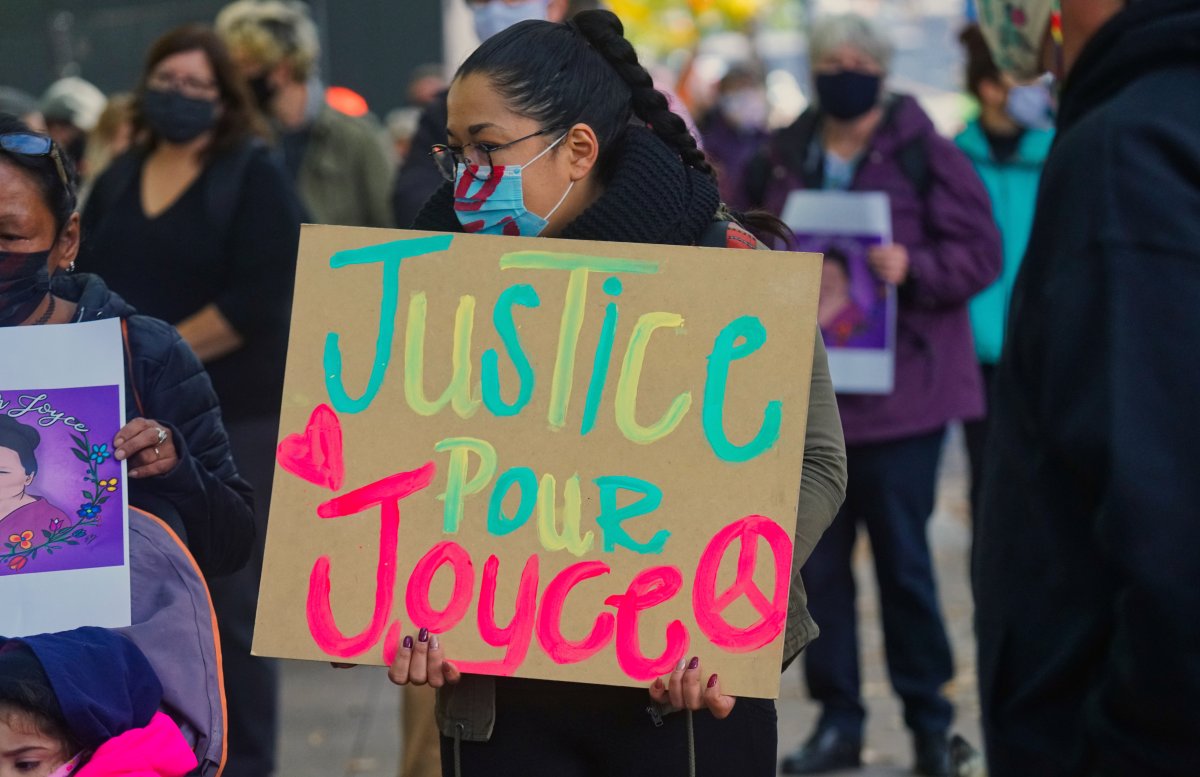A Quebec nurse who was fired for insulting Joyce Echaquan as she lay dying in hospital last September apologized to the patient’s family Thursday during a coroner’s inquest, admitting her derogatory comments were cruel.

The Quebec coroner’s inquiry is examining the circumstances of Echaquan’s death on Sept. 28, 2020, at the hospital in Joliette, Que., northeast of Montreal. Echaquan, a 37-year-old Atikamekw mother of seven, used her phone to film herself at the hospital as a nurse and an orderly were heard insulting and mocking her not long before she died.
The nurse, who is currently unemployed, is heard at various points in the seven-minute video after Echaquan had fallen for a second time that day, saying the Atikamekw woman was stupid, good for sex, a drain on the health system and better off dead.
“I know that I was cruel and I apologize,” the nurse, 54, told the inquiry in tears. She also addressed Echaquan’s family directly: “I beg your forgiveness for what I said. I’m sorry, I too wouldn’t have liked someone to talk like that to someone in my family.”
READ MORE: Fired Quebec orderly says her insults toward Joyce Echaquan were meant as motivation
She said she was overworked and stressed when she made the comments toward Echaquan, adding that the hospital had a labour shortage made worse by the COVID-19 pandemic.
The coroner, who is also overseeing an inquiry into COVID-19 deaths in long-term care homes in the province, said being overworked is not an excuse.
The nurse insisted she didn’t insult Echaquan because the patient was Indigenous.
“I was angry, I’ve never spoken to a patient like this and I wasn’t angry at her because she was an Atikamekw patient, I was angry at the situation, the workload, the pressure,” she said.
She said she found Echaquan’s phone and noticed it was recording because she could see her face on the screen, adding that she quickly pressed “delete.”
The nurse either denied or said she couldn’t remember making other derogatory or displaced comments toward Echaquan that were not caught on video but reported by emergency room witnesses.

She testified that she didn’t have issues with treating Atikamekw patients but said they were more reserved than non-Indigenous patients. She said that when they started speaking to each other in their native language, she thought they were laughing at her.
The nurse said that when she heard her comments in the video later, she couldn’t believe she had uttered them. “When I heard it, I was like, ‘it’s not me,'” she said.
The inquiry has not heard the cause of Echaquan’s death — a coroner’s report has been completed but not made public.
Echaquan was transported to hospital on Sept. 26 with severe stomach pains. The inquiry has heard that she had numerous health problems including diabetes, heart issues and a pacemaker.
A gastroenterologist who examined Echaquan has told the inquiry he believed she was going through opioid withdrawal and had scheduled a colonoscopy to figure out what was causing the stomach pains.
The Echaquan family lawyer in his questioning has asked whether medical staff were too focused assuming she was on drugs and ignored other possible ailments.
Dr. Jasmine Thanh, a family doctor working in the emergency room the day of Echaquan’s death, testified Thursday that the patient’s mood changed rapidly. She said she went from having a cordial conservation with Echaquan and agreeing she should be discharged, to prescribing the antipsychotic drug Haldol to calm her down.
Thanh said she also authorized putting Echaquan into restraints after the patient became agitated and allegedly aggressive with staff. She said it is hospital policy to take vital signs every 15 minutes from patients who are put into restraints and to monitor them closely.
Thanh said she received a call from a nurse in training who was supervising Echaquan, and who told her the patient wanted to sign a waiver to cancel the colonoscopy that had been prescribed. Not long after, Thanh said she rushed to emergency after Echaquan’s vital signs crashed.
The doctor said the attempts to revive Echaquan lasted 44 minutes but failed. She said she met with Echaquan’s relatives twice the following day to explain what she thought had happened.
Her family has testified Echaquan was fearful of getting treatment at the hospital because she had allegedly been abused and insulted there by staff and had been allegedly overmedicated and restrained.
Some witnesses have told the inquiry a mutual mistrust exists between staff and Indigenous patients at the hospital.
Also Thursday, coroner Géhane Kamel appealed for calm after one of the lawyers for the regional health authority said nurses who had testified during the inquest had received death threats. The identities of hospital staff are under publication bans.
“Nobody is going to resolve this situation by wishing for the death of someone,” Kamel said. Ahead of this week’s testimony, Echaquan’s family and Atikamekw community leaders had appealed for calm.
Quebec provincial police have been notified of the threats, the coroner said.



Comments